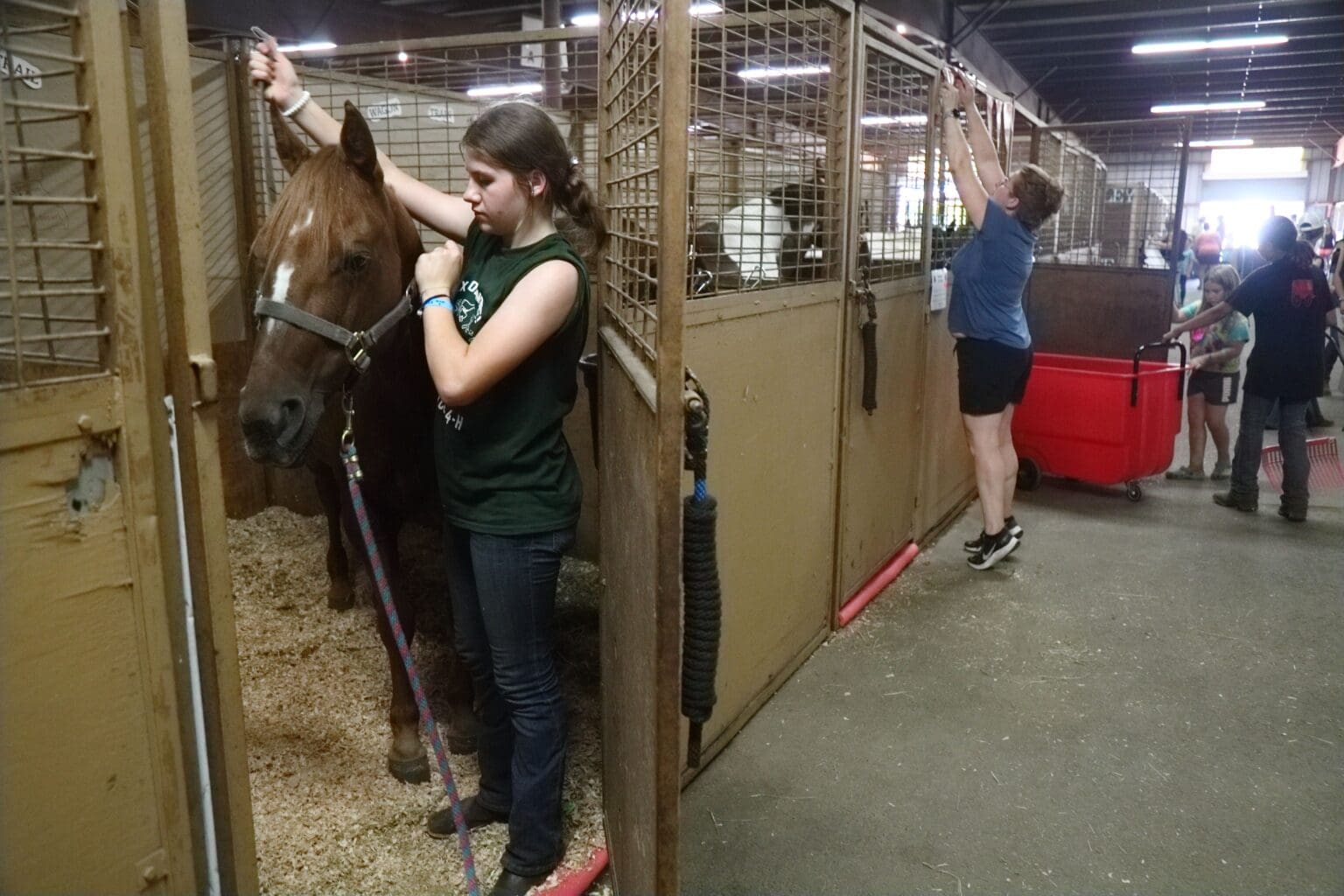Three generations of sisters and daughters filled the Northwest Washington Fair horse barn last week, raking hay, feeding horses, and helping to make the opening day of the fair run smoothly. These women are part of the Rockin Wranglers, a Whatcom County 4-H club.
4-H (standing for head, heart, hands and health), is a nationwide youth program that began more than 100 years ago, making its way into county fairs around the country.
The life lessons youth gain through their 4-H experiences are often passed down through generations.
Family connections
Dori Wilson, 61, is the fearless leader of her family during days at the fair. Dori first began 4-H when she was in fifth grade in 1972, and has since participated in her kids’ and grandchildren’s programs.
As a child, Dori’s fondest memories of 4-H were at the fair. Now with her kids and grandkids, the best moments are helping her family members in their club journeys.
“For the kids, [the best part], I think, has been setting goals,” Dori said. “And then working really hard to get [to] the next step. That has been huge for us.”

At the fair, “all the kids are your own kids,” said Shannon Richardson, Dori’s daughter. Shannon, 40, wasn’t in 4-H growing up like the rest of her sisters, but she was raised riding horses. Now, she is a 4-H leader and is helping her kids participate in the fair.
Shannon’s three younger sisters have all participated in the program, including 22-year-old Clara Didonato. Clara hopes to pass on her passion to her children.
“I was the president of our club for many, many, many years,” Clara said. “It really taught me how to be a really good leader, and just how to help the littles grow and give them advice on doing more with 4-H, and just getting out there because there’s so many different things to do.”
Competing at the fair
Dori’s youngest daughter, Melanie Wilson, won a blue ribbon at her first “showing” of the day Thursday, Aug. 10. She moved on to the championship that afternoon — her first time — and won a red ribbon in that round, equivalent to second place.
“I overthink everything, and I just don’t think I’m going to do very good,” Melanie, 16, said. “But I think that makes me do better because I kind of set out a plan for myself, and then I just follow it.”
“Showing” refers to showmanship, a type of competition that involves leading an animal through a series of movements called a pattern. This type of competition has roots in 4-H, and is a way for youth to show how well they have trained and taken care of their animals.
4-H competitions can be less serious, too, like a llama and alpaca costume contest.

CJ Matthews’ three kids raise alpacas and pygmy goats in 4-H. Her son, Blake Justice, 16, dressed their alpaca, Twister, up in winter clothes for the costume contest. The animal wore a matching coat and scarf, despite the hot summer weather. CJ’s daughter, Brooklyn Justice, 10, dressed up her alpaca, Dolly Daisy, in sunglasses and leis for a luau-themed costume.
Brooklyn was putting purple glitter in Dolly Daisy’s fur up until the last moment before the contest began. Meanwhile, Blake was trying to balance earmuffs on Twister’s head.
CJ didn’t grow up doing 4-H, but loves being involved in what her kids are doing now. Although 4-H is a youth program, it is oftentimes a whole family commitment — especially during the fair.
“Everyone’s like a big family,” Matthews said. “We always eat dinner together. Everyone takes turns making it, and so for fair week, it’s like we live here all together.”
The animals often become like family, too, as kids and their parents prepare year-round for the fair.
Relationships and responsibilities
Clara got her first horse, Wisdom, from a slaughterhouse when she was a kid. From there, she worked for years training the horse and Wisdom has been passed on to other family members and is an experienced fair horse.
The act of training, riding and taking care of animals can teach children responsibility, Clara said.

Growing up with animals also teaches relationship skills. Each horse has a distinct personality, Clara said. Some horses are mellow — shy even — while others are rowdy and anxious.
Riding and training a horse, Dori said, is about teamwork.
“When things don’t go well, that’s you and the horse,” Dori said. “It’s a partnership.”
No matter the animal, forming a relationship is an important part of being in 4-H. Katie Oakes and her three kids became involved in 4-H in 2019. This year, her kids are showing market goats and pigs at the fair.

Unlike the horses and alpacas, market animals are sold on the last day of the fair to individuals or businesses who go on to donate or sell the animals themselves.
This will be the family’s first time selling market animals.
Kids work all year building trust with their animals: They buy them, breed them, care for them and train them. Then, they let them go, Katie said.
“They are fun to be around,” said Lane Oakes, 13. “But [I] try not to be super attached because then it’s harder to sell at the auction.”
4-H animals and other 4-H programs can be found at the Northwest Washington Fair every day through Aug 19. Learn more about Whatcom County 4-H programs here.





